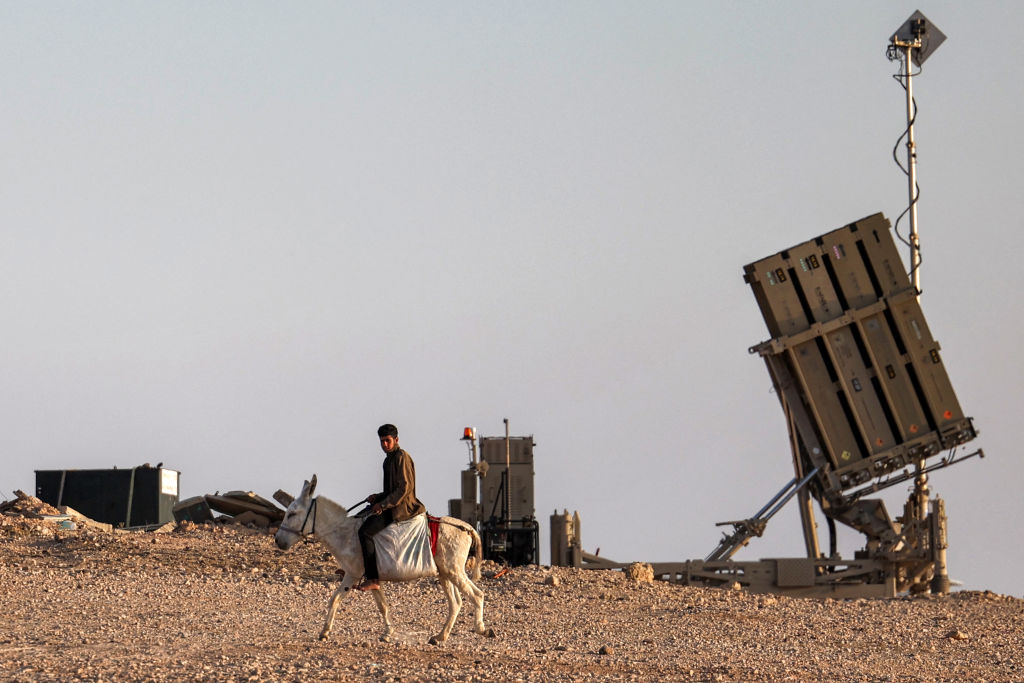Iran’s unprecedented attack on Israel Saturday night represents a dangerous escalation for three reasons. The first is its scale, some 300 drones and missiles. Second, it marks the first time the Islamic Regime has launched a lethal attack on Israeli territory from Iran itself, rather than through proxies. Most important of all is the combination of the first two: a major attack launched against Israel from Iranian territory. Although Israel, the US, the UK and, surprisingly, Jordan managed to shoot down nearly all the incoming drones and missiles, it was the thought that counts. And it was a very dangerous thought. Within hours, the Iranian attack changed the region’s strategic landscape. It brought the Islamic regime into direct, open military conflict with Israel and its Western partners. More bloodshed is sure to come.
Iran says it’s all over. Done. There’s no need for any response from Israel, they say. We were just “retaliating,” a term emphasized in headlines from the New York Times, MSNBC and others on the left. The effect of that framing is to justify Iran’s major escalation. That may play well on the Upper West Side, but not in Tel Aviv, Haifa, or Jerusalem. For Israel’s War Cabinet, the only questions now are how intense the Israeli response will be and whether that will lead to tit-for-tat escalation?
The crucial point is that Iran’s decision to launch a direct attack on Israel marks both a basic change in the strategy of Islamic regime and, consequently, a major change in the region’s politics, diplomacy and security.
What’s new is not that Iran has responded militarily to Israeli actions, like the one that killed a senior Iranian commander in Syria. It has always done that. What’s new is how Iran responded. Until now, it has always responded through proxies. This time was different.
Why such a dramatic change in Iranian strategy? The answer is unclear. Does it represent a shift in who controls the regime’s foreign policy? Or does it represent shifting views and greater risk acceptance by the same old leaders? We simply don’t know, at least not yet. What we do know that this barrage is not the first sign of Iran’s greater aggressiveness. Its direct attack on Pakistan is another sign.
We know, too, that the Biden administration’s efforts to deter Iran failed. The question, as always with policy failures, is whether those responsible will change their stance or dig in their heels.
In this case, the failure comes from the top: President Biden. The president, secretary of defense Lloyd Austin, national security advisor Jake Sullivan and other senior administration officials repeatedly gave Tehran a one-word message: “Don’t.” Uttering a single, ominous word was supposed to convey special authority. It didn’t work. What it told the world, we now know, is that the Biden administration’s threats were too feeble, too incredible to deter Iran.
In the last few days, the administration supplemented its rhetoric by deploying more ships and planes to the region. Neither the US military assets nor the tough talk managed to deter the radical Islamist regime. Either Tehran didn’t believe the words coming from Washington, or, like Japan before Pearl Harbor, it believed them but was willing to accept the risk. Why Iran is more “risk acceptant” now than in the past is unclear.
In any case, Iran’s attack marks the dramatic failure of US deterrence in the region. That’s a very bad sign for America’s other partners around the world, especially Taiwan.
The Iranian attack also marks the failure of the Biden administration’s broader effort to cope with Tehran by “playing nice.” Naturally, the administration will deny that’s what they have been doing. The denial is false. That’s exactly what they have been doing. It has been the foundation of their Middle East strategy.
Now that their strategy has failed, they need to acknowledge it, at least privately, so they can begin to change. Whatever the White House does, the rest of us should recognize the failure and hold the Biden administration accountable. You can be certain that Donald Trump will drive home the point and, of course, say it would never have happened on his watch.
He’s right to say the failure began when President Biden deliberately reversed the Trump administration’s strategy of building a strong anti-Iran coalition and starving the Islamic regime of foreign income. It managed to do that without putting more US troops in harm’s way. Trump’s unpredictability plus his deadly strike on Iranian military leader, Qasem Soleimani (in January 2020), made his threats credible. Biden’s threats clearly were not. Again, you can expect Trump to emphasize the difference on the campaign trail and underscore how Biden’s policies have led to disasters in Afghanistan, Ukraine and now the Middle East.
When Trump left office, Tehran was almost completely drained of foreign currency, thanks to the stringent application of sanctions. Biden’s more lenient policy — retaining the sanctions in name only but refusing to enforce them — allowed the Islamic Republic to rebuild its treasury. The administration’s forlorn hope was that Tehran would become part of a wider, more cooperative region and would be encouraged by Washington’s outstretched hand. In fact, they slapped down that hand time after time. On Saturday, they tried to amputate it. Biden’s Middle East strategy now lies in ruins.
One immediate question facing the administration is whether it will back a new arms package for Israel. A major one passed the US House with strong bipartisan support after Hamas’s terror attacks in October 2023. It died in the Senate when Majority Leader Chuck Schumer and every other Democrat opposed it, with Biden’s backing. They were not against aid to Israel, but they were unwilling to pass it without aid for Ukraine and other provisions.
House Speaker Mike Johnson could easily pass another arms package for Israel (and Israel alone) this week. It would be the right thing to do strategically and clever politically since it would force the Democratic Senate either to act or to pay a high price for refusing.
The problem for Democrats is two-fold. First, they want to pass an aid package for Ukraine, a desire shared by many, but not all, Republicans. Since funding Israel has nearly-universal support but Ukraine does not, the administration had hoped to pass the Ukraine package by tying it to Israel. That will be much harder to do now that Israel needs the aid immediately. The Republican House can hand the Senate an “Israel-only” package and force the Democratic Senate to make very hard choices.
Second, the Biden administration knows the left wing of the Democratic Party plus Muslim voters strongly oppose any military aid or diplomatic support for Israel. The president needs their votes in November. They were already accusing the Biden administration of “genocide” for giving Israel any support in Gaza. Providing more weapons to Israel now would compound Biden’s electoral problems.
Much as Israel needed the weapons six months ago, when the House passed the original package, it needs them even more urgently now. Among other things, it must replenish the anti-ballistic missiles used to thwart the Iranian attack. Without those arms, Israel would be vulnerable if Iran or its proxies renew their missile attacks. Some attacks are almost certain once Israel responds to the latest bombardment.
Over the past week, as it became clear Iran would attack, the Biden administration offered Israel defensive military assets and made sure Tehran knew. There was no equivocating, as there has been in recent weeks about Israel’s strategy in Gaza. It was a strong move, though not strong enough to deter Iran.
The US followed through by sharing intelligence and working effectively to shoot down Iranian drones and missiles fired at Israel. The American response undoubtedly strengthened the alliance, which has been strained in recent months by the war in Gaza.
American aid during the Saturday attack served an important US goal in the region: preventing a much wider war. The more Israelis killed by Iran, the more likely the Jewish state would respond with crushing force. The US wants to avoid that escalation. Providing defensive military assistance helped Israel avoid those casualties and gives Washington more leverage.
Iran has told the US repeatedly that it should avoid any involvement in the fight. Biden and his team ignored that warning in a tangible way when they helped shoot down drones and missiles. The question is how Iran will respond to the US action. It would be foolhardy for Iran to respond directly by striking American forces. They apparently avoided doing so during the Saturday night bombardment. There is a danger, though, that they will activate sleeper cells in the US or Europe and urge proxy forces in Lebanon, Syria, Iraq or Yemen to target American interests.
Israel will undoubtedly respond militarily to the Saturday attack. The only questions are how intense the counter-strike will be and what Iran will do afterwards. Typically, Israel hits back harder than the blow they suffered. That’s certainly how they have responded to Hezbollah, Iran’s proxy in Lebanon.
Israel’s response will renew strains on the alliance with Washington. The comradery, so evident after stopping the Iranian drones and missiles, will fade as basic policy differences reemerge.
The Biden administration will undoubtedly press for the lowest-level retaliation and refuse to help with any offensive strikes. That approach is consistent with Biden’s restrained policy across the region. Remember the administration did almost nothing when Iranian proxies attacked US bases over 100 times and remained quiescent even after Americans were killed and injured. At some point, the enemy interprets restraint as weakness. That judgment is the main reason the administration’s deterrent posture wasn’t credible.
It is unclear whether Israel will take Washington’s advice to moderate its response. Israel’s preeminent goal is to restore deterrence and thus security for its people. Washington’s preeminent goal is to avoid a regional war, which could draw in the United States. A full-scale regional war would be catastrophic, for the nations involved, the US, and the world economy.
If Israel responds aggressively, or if Iran interprets Israel’s military and cyber actions that way, it is bound to affect bilateral relations between the US and Israel. Israel’s War Cabinet has some flexibility here because the Saturday attack did not kill or seriously injure many Israelis.
Gazing over the horizon, the most troubling portent from Saturday’s attack is the shadow of what a nuclear-capable Iran might do. What if the mullahs and Iranian Revolutionary Guard put a nuclear bomb on one of their missiles, either one they produced themselves or purchased from North Korea? They are already close to domestic production and have tight relations with North Korea, which badly needs the income from military sales.
The Islamic Republic’s willingness to attack Israel directly and to accept enormous risk in launching that attack is a very troubling sign about that nuclear future. It puts tremendous pressure on Israel to take out the Iranian nuclear program before it yields a deliverable bomb. The danger, obviously, is that a direct strike on Iranian nuclear facilities would likely prompt a wider conflict. For that reason, it would be a momentous decision for Jerusalem and would meet strong opposition from Washington.
Whatever Israel does, the Biden administration’s whole approach to Iran lies in ruins and needs to be reevaluated and revised. The administration’s threats and military deployment failed to deter Iran. Trying to “play nice” failed. Letting Iran rebuild its finances failed. Worse, it backfired. It gave the regime more resources to continue its drive for regional hegemony, to fund and arm its proxies, and to attack Israel, Saudi Arabia and US interests across the region. The administration’s dismal record won’t improve without major changes to the strategy that undergirds it.
So, what now?
For Israel’s war cabinet, the question is not whether to hit back at Iran but how hard. They know that any strike, big or small, could bring a more rockets raining down from Hezbollah, the Houthis in Yemen, and Iran itself.
They know, too, that the Biden administration will oppose any major strike against Iran. American pressure certainly matters to Netanyahu and the War Cabinet, but it will not control their decision, if they believe a major military operation is essential for Israel’s security.
For the Biden administration, the Saturday attacks cast a harsh light on a failed regional strategy. That failure has been evident for some time, at least outside the White House and State Department, but the administration has done nothing to adapt and change. The question now is whether the administration will formulate a new approach.
Reversing course is never easy for political leaders. It certainly won’t be for the Biden administration, which has clung stubbornly to other failed policies, notably those on illegal immigration and an open Southern border.
Change will be even harder this year because of the November election. Biden’s political team is understandably worried about progressives’ antipathy to Israel and the Muslim vote in Michigan and Minnesota. They need those votes and a unified party to win.
For the Biden administration, the political dangers are real. They threaten reelection, domestic unrest this summer and wider war in the Middle East. The hard question is how to navigate among those rocky shoals. Sticking with the same failed policies won’t work. It’s just sending the same battered ship into the same rocks.


























Leave a Reply